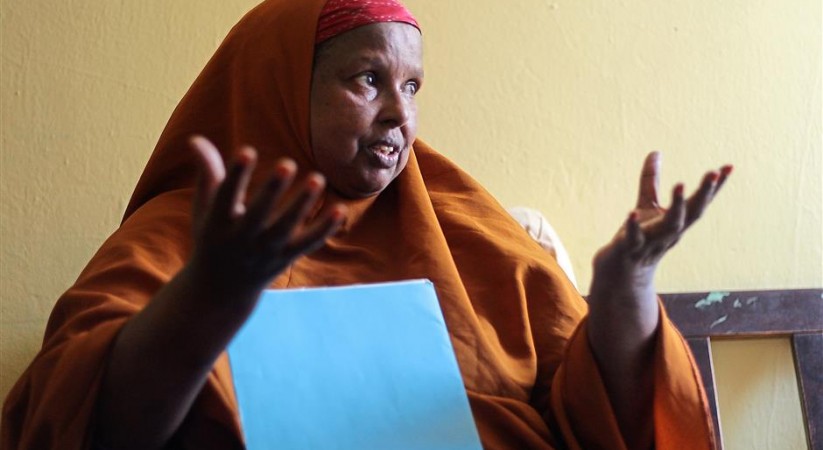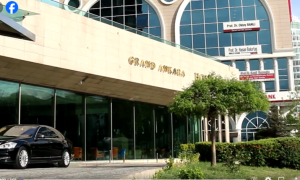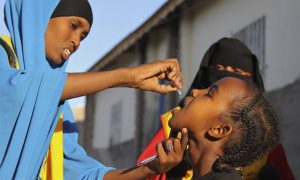
Pillar of strength |
March 8, 2016 – Her name is Adar. She is a big woman, sturdily built, with a small, bare face; her nails are stained a reddish-orange rust from henna. The 45-year-old widow speaks softly through an interpreter, never quite making eye contact. She is a Somali refugee, and her journey here has been perilous.
“I came to Malaysia in November 2007 with three of my children. My eldest son is in Kenya,” she says, fingers on her temples. “My husband was killed earlier in 2007. I came here looking for safety.”
Running from a country ripped apart by civil war, she left behind a “happy life” that was “middle-class and normal”.
In Somalia, there was a jewellery store and a big house; the children went to a good school. In Kuala Lumpur, there is a flat barely big enough to house the family. But she had to fight to get this flat, had to fight to fill it with old furniture.
“When I came here, my kids were young. There were many problems: I couldn’t speak the language; I didn’t know how to start a new life in a foreign country; and I didn’t know how to find a job,” she says, clutching her UNHCR file.
As a single mother, she already had to fend for her children by herself. As a refugee, stateless and without the protection of a government, she is even more vulnerable.
Her eyes well with fresh tears as she remembers how hard it was just to survive. Now her children are teenagers – 16, 17, and 19 – attending a school for refugees.

She works as a seamstress, spending her days sewing on an old Singer machine. The UNCHR has given her a livelihood, she says, taking out a certificate for a sewing course from the file.
In Somali fashion, she makes bright, patterned fabrics, and sells them to fellow Somalis and Arabs.
“I make the decisions for my family. It’s not an easy job, shouldering the responsibility, thinking about how to survive.”
But after nine years here, things are different and she’s “happier” because they “fit in more”.
A world away from the life she knew, she’s come out on the other side.
She wants to tell other women like her to “be patient, work hard, and be brave”.
There is always hope
Shirley Leong is a pint-sized woman, polite and attentive.

Her hair hangs loose in chestnut curls; her face is carefully made-up. A career woman, the 54-year-old banker has spent 32 years climbing up the corporate ladder, rung by rung. Now senior vice president in Treasury and Trade Solutions at Citibank, she never expected that her husband would lose his battle to cancer three years ago.
“Everyone thinks that everything settles down after the wake, but that’s when all the sorrows come out,” she says. She mourned for him by going for grief counselling, supported by her two adult children, Sam and Sara.
“I could either throw myself into work to forget about the grief, or choose to have a work-life balance,” she says. “My faith really helped me. It was not an easy journey; there have been ups and downs.”
Her husband was sick for three years before he died, so it fell on her to manage it all.
“I had to. Going through treatment, he was too weak to continue working. I had to take responsibility for the finances, the home,” she says. “So it went from husband-and-wife to just me.”
But the glamorous powerhouse did what she had always done: persevere, no matter what. “As a career woman, the support of Citibank was very important. And the support of my siblings. I’m very lucky to have an elder sister who stayed with me and helped us.”
She has found that being a lay grief counsellor has helped her to “overcome” her own grief. No longer mired in shock and denial, she wants to reach out to others and give back.
“I want to encourage women in my situation to know that in their loss there is hope. Remember that ‘a bend in the road is not the end of the road unless you fail to make the right turn.’”

Standing proud
Aznie Rahim is 38, a civil servant with a frank, open smile. She has been divorced for six years, a fact she has no qualms disclosing.
“The divorce was swift because he wasn’t able to provide,” she says, gaze direct. “He didn’t want to; he couldn’t. I couldn’t get him to provide child support in Shariah court.”
She shrugs, unsurprised. Her two sons, nine and 11, are at school. Dim sunlight filters in through the windows. On the coffee table, there is a neat stack of clothes, newly folded. In the kitchen, a blue polka-dot apron hangs from a hook. Tacked to the fridge is a photo of her son in a pilot costume, surrounded by a calendar, some colorful magnets, and a child’s drawing of a beach with a half-smiling sun.

“I cook every day,” Aznie says. “The most cost-effective way to manage a household is to do everything yourself. Is it hard? Sure, but I go online and find recipes that I can make in half an hour.”
She manages childcare on her own, except for the weekends when her mother takes over to spend time with them. Her ex-husband sees their sons when he has the time.
“My mother is a divorcee, so I knew what to do. It was depressing for the first two years, being on my own.”
She handles the stigma of single motherhood in her usual, upfront way. She doesn’t shy away from people’s judgments, doesn’t make excuses for their lack of empathy.

“We don’t care whether a woman is able to eat or feed herself,” she says. “We care more about whether she’s sticking to the moral code. The ladies around here are worried that single mothers will steal their husbands.
“Even my brother doesn’t approve of me. He thinks I should conform like a normal Malay woman.”
There was an altercation, and the police were summoned. But she doesn’t bear grudges, and she doesn’t walk around with an invisible scarlet letter pinned to her chest. She carries herself proudly, like a woman in love with life.
“I’ve decided that I want to go to Australia to further my studies and get a Masters.” It’s a plan she made for herself and has saved up for. It’s a goal to work towards, for herself and for her sons.
“The investment is for you,” she explains. “Your career and the income it generates is for your children. And your children will see you as a happy, fulfilled person.”
Taking the reins
Adele Cheah lost her husband two years ago. He was a tour guide who had taken a group of tourists to a waterfall. He drowned while trying to save someone else. Their two children were only four and eight months old then.
Overnight, her world was thrown into chaos. After “grieving” and “crying [her] eyes out”, she learned of all the challenges she would have to tackle as a single mother.
“When you have a husband,” Cheah says, “everything is split. But now I have to manage the time. I have to run the household, provide for the kids, and take care of them.”
The hands-on mother freelances from home, juggling phone calls and meetings with school runs and meal prep. Her home is airy and cosy, built for comfort and the needs of young children. There is a small zoo of stuffed animals, baskets of toys, and an easel where her daughter frees her imagination.

“My parents and my church have been supportive. People have offered to babysit and to take them to the playground,” she says. The petite mother is active and fit, but there are times she just wants a timeout.
“Single mothers are regular people with our desires to do our own things – sometimes we need that space to be our own person.”
Cheah relies on a support network of family and friends who volunteer their time. One of the toughest issues is being both father and mother to her kids.
“I also have to be a father to them now. My father has stepped in, but because my son has no memory of his father, he only has an understanding of what a grandfather is,” she explains. “I also involve other male members of my family to be father figures for them.”
For now, she doesn’t think in terms of large blocks of time, focusing instead on the “here and now”. She says that going from a double-income household to a single-income one is a “financial strain”, but that she’s lucky she’s managed so far.

Cheah’s children are her main priority, and she has to be both mother and father to them. Photo: The Star/Sam Tham
Cheah’s children are her main priority, and she has to be both mother and father to them. Photo: The Star/Sam Tham
“I know that working full-time at the office would mean I could make more money, but I’ve chosen to stay home so I can take care of my children,” she says. “They’ve already lost a father; I don’t want them to miss out on a mother.”
Her children are her first priority. In the family’s living room, they stare out from framed photos: a little girl with an elfin face, and her grinning younger brother. She plans her day around the children’s activities, from nap times to play time. While she isn’t given to speculating about the future, she knows she wants to “raise them well”.
She credits her strong spiritual faith for seeing her through.
“Because of my spiritual faith, I’ve been able to come out of this joyful and to know that there is a purpose and plan for me, even if I may not know it now.”
And although taking the reins has been “empowering”, it has also been daunting: “You’re the one who makes the decisions and carries them out. It can be scary because you don’t have a second person to fall back on.”
For that reason, she encourages single mothers not to be “shy” and “ask for help” when they need it. There’s no shame in not being able to do it all on your own, she says, because it does “take a village to raise a child”.
“Sometimes people don’t step up because they think that you’re so strong and can do it on your own, or other times they take pity on you,” she says, eyes glinting. “I think within the community, it would be great if people could lend a hand.”
.
.
.
____________________
_____________________________________________________________________________________
Xafiiska Wararka Qaranimo Online | Mogadishu, Somalia
_____________________________________________________________________________________Advertisement
_____________________________________________________________________________________







